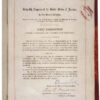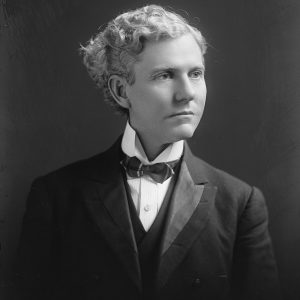calsfoundation@cals.org
Robert Minor Wallace (1856–1942)
Robert Minor Wallace was a Democratic member of the U.S. House of Representatives. He represented the Seventh District of Arkansas in the Fifty-Eighth through the Sixty-First Congresses, serving from 1903 to 1911.
Robert Wallace was born on August 6, 1856, in New London (Union County), the second of three children of William Jonathan Wallace and Susan Wallace. His mother died when he was not quite four years old, and his father, a major in the Confederate army, was killed in combat in May 1864, leaving him orphaned at age seven. Living with extended family, Wallace received his early education in the local common schools, and he graduated in 1876 from Arizona Seminary in Louisiana.
After studying law in Little Rock (Pulaski County) in the office of prominent local attorney Uriah Milton Rose, Wallace was admitted to the Arkansas bar in 1879.
Wallace was married twice. He married Minnie Pennington of Louisiana in 1879, and they had four children before her death in 1886. Wallace soon married Jennie Kelso; they had two children together.
He relocated to El Dorado (Union County) to establish a legal practice and soon entered the political arena, winning election to the Arkansas House of Representatives, where he served in 1881 and 1882. In addition to his legal practice, Wallace founded a newspaper, the Union County Times, which he would edit for some time as a complement to his law practice. Selling the newspaper in 1884, Wallace moved to Magnolia (Columbia County) and began a legal practice there. In 1887, he accepted an appointment from President Grover Cleveland to serve as U.S. post office inspector, a position he held until 1891. Shortly afterward, he became prosecuting attorney for Arkansas’s thirteenth judicial district, an office he held until 1892. He served as assistant United States attorney in 1894.
Running as a Democrat in 1902, he won a seat in the U.S. House of Representatives. He served on the Committee on Private Land Claims and the Committee on Coinage, Weights, and Measures. In addition, he served on the Levees and Improvements of the Mississippi River Committee, an assignment that went well with his work as a member of the Congressional Red River Improvement Association. He was active in the effort to open the Red River to greater steamboat navigation, something that was seen as helping in the development of the state’s economy.
He earned a reputation as a highly skilled orator, with House Speaker Champ Clark and the era’s most famous speaker, William Jennings Bryan, both commenting favorably on his oratorical prowess. Wallace won reelection three times, with his 1908 victory being the only time he had less than eighty percent of the vote. However, there had been an intraparty challenge in 1908, and sensing some weakness in the general election results, those same forces again challenged Wallace’s bid for the party designation, ultimately denying him re-nomination in 1910. He served the Seventh District from March 1903 until March 1911.
Wallace resumed his law practice in both Hot Springs (Garland County) and Little Rock. He also was an active speaker on the Chautauqua circuit as well as active in the Anti-Saloon League, where he saw his efforts rewarded with the ratification of the Eighteenth Amendment in 1919. In his later years, Wallace moved back to Magnolia, and he was living there when he died on November 9, 1942. He is interred in the Magnolia Cemetery.
For additional information:
Biographical and Historical Memoirs of Southern Arkansas. Goodspeed Publishing Company, 1890.
Herndon, Dallas Tabor. Centennial History of Arkansas. Vol. 3. Chicago: S. J. Clarke Publishing Company, 1922.
“Robert Minor Wallace.” Biographical Directory of the United States Congress. http://bioguide.congress.gov/scripts/biodisplay.pl?index=W000082 (accessed October 30, 2025).
William H. Pruden III
Ravenscroft School







Comments
No comments on this entry yet.